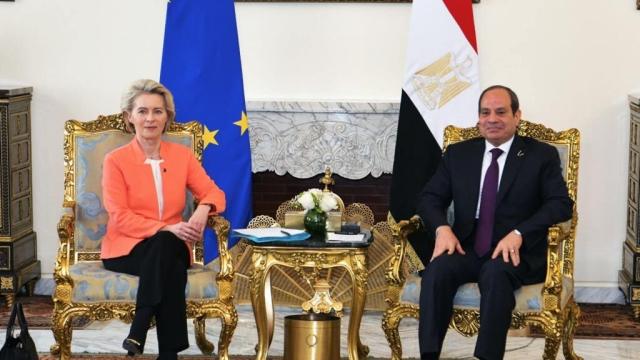In a bid to address the issue of migration, the European Union has pledged a substantial €7.4 billion aid package to Egypt, along with an enhanced partnership. This move, announced on Sunday, aims to mitigate the flow of migrants towards Europe, a move previously criticised by human rights organisations.
The accord elevates the EU’s association with Egypt to a strategic partnership and was revealed during a visit by a delegation of leaders to Cairo. The objective is to bolster collaboration across various sectors, such as renewable energy, trade, and security. The funding, spread over the next three years, comprises grants, loans, and other financial assistance to bolster Egypt’s struggling economy.
Outlined in a summary released by the European Union, the proposed funding encompasses €5 billion in concessional loans, €1.8 billion in investments, and €600 million in grants, with a portion allocated specifically for migration management.

Italian Prime Minister Giorgia Meloni, who was part of the delegation alongside European Union Commission President Ursula von der Leyen and other European leaders, asserted that such agreements represent the most effective approach to addressing migratory challenges.
Concerns over Egypt’s stability have long troubled European governments, given its significant population of 106 million grappling with economic hardships, including soaring inflation rates. However, recent developments, such as substantial investment from the UAE, an expanded programme with the IMF, and currency devaluation, have provided some relief.
The strategic importance of Egypt has been underscored by its efforts to mediate in the Gaza conflict and address the humanitarian crisis in Sudan. Both von der Leyen and Egyptian President Abdel Fattah al-Sisi emphasised the urgency of reaching a ceasefire in Gaza to prevent further displacement.
Egypt has secured substantial multilateral support, totaling $20 billion, following its efforts to bolster economic reforms in collaboration with the IMF. The majority of the EU funding, developed in coordination with the IMF, is earmarked for immediate delivery, with the remainder contingent on approval from the European Parliament.
Despite previous measures to curb irregular migration from its northern coast, Egypt has witnessed a recent surge in attempts to reach Europe via Libya, prompting increased EU support to address these flows. The rise in migrant arrivals, particularly from Egypt, Bangladesh, and Pakistan, has led to intensified efforts between Greece and Egypt to establish legal pathways for migration while preventing the emergence of new migration routes.
However, Western support for President Sisi has drawn criticism from activists, citing human rights abuses and a lack of democratic freedoms. While the European Union asserts its commitment to promoting democracy and rights, its approach of providing financial incentives for migration control has faced scrutiny, echoing previous challenges encountered in deals with Tunisia and Mauritania.
Human Rights Watch has condemned these agreements, labelling them as flawed and overlooking human rights abuses in pursuit of migration containment.


